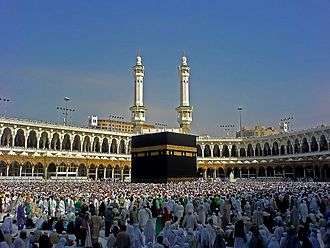Tashahhud
The Tashahhud (Arabic: تَشَهُّد), meaning the testimony of faith, also known as Attahiyat) is the portion of the Muslim prayer where the precant sits on the ground facing the qibla, glorifies the God, and greets the messenger and the righteous people of God followed by the two testimonials. The recitation is followed by an invocation of the blessings and peace upon the prophet known as Salawat or Darood.
| Part of a series on |
| Islam |
|---|
 |
|
Origins
There is a Hadith, thought to be authentic that states:[1]
Narrated Ibn Mas`uud:
Ibn Mas'ud is reported to have said that the Messenger of Allah (peace be upon him) taught me tashahhud taking my hand within his palms, in the same way as he taught me the chapter of the Quran, and we also read it after his passing away.
Sunni tradition
Hanafi and Hanbali
Sunni Muslims from both the Hanafi and the Hanbali schools of thought and the minority Ibadi sect recite the Tashahhud (attributed to Abdullah ibn Masud) as:
At-taḥiyyātu lillāhi, wa -ṣ-ṣalawātu wa -ṭ-ṭayyibātu. As-salāmu ʿalayka ayyuhā n-nabīyyu wa-raḥmatu llāhi wa-barakātuh. As-salāmu ʿalaynā wa-ʿalā ʿibādi llāhi ṣ-ṣāliḥīn. Ašhadu an lā ilāha illā llāhu wa-ašhadu anna Muḥammadan ʿabduhu wa-rasūluh.
التَّحِيَّاتُ لِلّٰهِ وَالصَّلَوَاتُ وَالطَّيِّبَاتُ، اَلسَّلَامُ عَلَيْكَ أَيُّهَا النَّبِيُّ وَرَحْمَةُ اللهِ وَبَرَكَاتُهُ، اَلسَّلَامُ عَلَيْنَا وَ عَلٰى عِبَادِ اللهِ الصَّالِحِيْنَ، أَشْهَدُ أَنْ لَا إِلٰهَ إِلَّا اللهُ، وَأَشْهَدُ أَنَّ مُحَمَّدًا عَبْدُهُ وَ رَسُوْلُهُ
This translates as: "Salutations to God and prayers and good deeds. Peace be upon you, O Prophet, and the mercy of God and his blessings. Peace be on us and on the righteous servants of God. I bear witness that there is no god but Allah, and I bear witness that Muhammad is His servant and His messenger."
Maliki
A variant attributed to Umar (preferred by the Maliki school of thought) is:
at-taḥiyyātu li-llāh az-zakiyyātu li-llāh aṭ-ṭayyibātu-ṣ-ṣalawātu li-llāh. as-salāmu ʿalayka ʾayyuha-n-nabiyyu wa raḥmat allāhi wa barakātuhu. as-salāmu ʿalayna wa ʿalā ʿibād illāhi-ṣ-ṣalihīn. ʾash-hadu ʾan lā ʾilāha ill-Allāh wa ash-hadu anna muḥammadan ʿabduhu wa rasūluhu.
التَّحِيَّاتُ لِلَّهِ الزَّاكِيَاتُ لِلَّهِ الطَّيِّبَاتُ الصَّلَوَاتُ لِلَّهِ السَّلاَمُ عَلَيْكَ أَيُّهَا النَّبِيُّ وَرَحْمَةُ اللَّهِ وَبَرَكَاتُهُ السَّلاَمُ عَلَيْنَا وَعَلَى عِبَادِ اللَّهِ الصَّالِحِينَ أَشْهَدُ أَنْ لاَ إِلَهَ إِلاَّ اللَّهُ وَأَشْهَدُ أَنَّ مُحَمَّدًا عَبْدُهُ وَرَسُولُهُ
This translates as: "Blessed salutations, pure actions, good words and prayers to God. Peace be upon you, O Prophet, and the mercy of God and His blessings. Peace be on us and on the righteous servants of God. I bear witness that there is no god other than ALLAH and I bear witness that Muhammad is His servant and messenger."
Shafii
Another variant preferred by Sunni Muslims belonging to Shafii school of thought is:
at-tāḥīyyātu-l-mubārakātu ṣ-ṣalawātu ṭ-ṭayyibātu li-llāh. as-salāmu ʿalayka ʾayyuhā n-nabī wa-raḥmat allāhi wa-barakātuhu. as-salāmu ʿalayna wāʿala ʿibād illāhi ṣ-ṣāliḥīn. ʾashhadu ʾan lā ʾilāha illā -llāh wa-ʾashhadu ʾanna muḥammadan rasūlu -llāh.
التحيات المباركات الصلوات الطيبات لله، السلام عليك أيها النبي ورحمة الله وبركاته، السلام علينا، وعلى عباد الله الصالحين، أشهد أن لا إله إلا الله، وأشهد أن محمداً رسول الله
This translates as: "Blessed salutations, prayers, good deeds to God. Peace be upon you, O Prophet, and the mercy of God and His blessings. Peace be on us and on the righteous servants of God. I bear witness that there is no god but God, and I bear witness that Muhammad is His messenger."
Shi'ite tradition
.jpg)
Jafari
The Imami Shi'ites of the Ja'fari school recite the Tashahhud as:
ʾashhadu ʾan lā ilāha illā -llāh waẖdahu lā sharīka lahu wa-ʾashhadu ʾanna muḥhammadan ʿabduhu wa-rasūluhu. allāhumma ṣalla ʿala muḥammadin wa-ʾāl muḥammad.[2]
أشهد أن لا إله إلا الله وحده لا شريك له, وأشهد أنّ محمدا عبده ورسوله. اللهم صلى على محمد وآل محمد
This translates as: "I bear witness that there is no god but God the One and no partner to Him, and I bear witness that Muhammad is His servant and His prophet. O God bestow blessings upon Muhammad and the household of Muhammad."
The Tashahhud is followed by the Taslim.
The bare minimum is to say "Assalamu Alaikum" (Peace be with you) السَّلاَمُ عَلَيْكُمْ. It is highly recommended, though, to add "Wa Rahmatul Lahi wa Barakatuh" (and God’s mercy and blessings) وَرَحْمَةُ اللهِ وَبَرَكَاتُهُ.[2]
It is highly recommended, though, to recite
Assalmu Alaika Ayyuhan Nabiyu wa Rahmatul Lahi wa Barakatuh, Assalamu Alaina wa Ala Ibadil Lahis Saliheen Assalamu Alaikum wa Rahmatul Lahi wa Barakatuh[2]
السلام عليك أيها النبي ورحمة الله وبركاته
السلام علينا وعلى عباد الله الصالحين
السَّلاَمُ عَلَيْكُمْ وَرَحْمَةُ اللهِ وَبَرَكَاتُهُ
This translates as: "May peace, mercy of the Almighty and His blessings be with you, Oh Prophet. May peace be with us and the good among Allah’s servants. May peace, mercy, and blessings of the Almighty be with you."
Zaidi
For the Zaidi, the middle Tashahhud after the second rakʿah is recited as:
Bismillahi wa Billahiwa alhamdulillahi wal-asmā`ul-husna kulluhā lillahi. Ashhadu an lā ilāha ila Allāhu wahdahu lā sharīka lahu wa ashhadu anna Muhammadan abduhu wa rasūluhu[3]
After the last rakʿah, the Zaidi recite the Tashahhud in its full formula:
Bismillahi wa Billahi wa alhamdulillahi wal-asmā`ul-husna kulluhā lillahi.[3](Or alternatively: At-tahiyyātu lillāhi was-šalawāt waŧ-ŧayyibātu.) Ashhadu an lā ilāha ila Allāhu wahdahu lā sharīka lahu wa ashhadu anna Muhammadan abduhu wa rasūluhu. Allāhumma salli ‘ala Muhammad wa āli Muhammad. Wa bārik ‘ala Muhammad wa āli Muhammad. Ka mā salayta wa bārakta ‘ala Ibrāhīm wa ‘ala āli Ibrāhīm. Innaka Hamīdun Majīd
Quranism
The minority Quranist sect reject the practice of Tashahhud as an innovation.[4]
References
- ↑ "Hadith - Asking Permission - Sahih al-Bukhari - Sunnah.com - Sayings and Teachings of Prophet Muhammad (صلى الله عليه و سلم)". sunnah.com. Archived from the original on 2017-11-15. Retrieved 2017-11-14.
- 1 2 3 "Dialogue on prayer (1) - Jurisprudence Made Easy - The Official Website of the Office of His Eminence Al-Sayyid Ali Al-Husseini Al-Sistani". www.sistani.org. Archived from the original on 2016-04-24.
- 1 2 }} This aforementioned wording ("Bismillah wa Billahi...") does appear in Zaydi books of hadith such as the Musnad of Imam Zayd (as), Amaali of Ahmed bin Isa bin Zayd (as), Sharh at-Tajreed and other books of hadith with complete chains of narrators. Its legitimacy and authenticity does not depend on whether Sunni narrators report it or not. If you peruse the Sunni books of hadith, you will find variant wordings for the tashahhud. As for the Sunni reports that narrate some of the wording of the Zaidi tashahhud: The wording "Bimillah wa Billahi" on the authority of Jabir (ra) appears in Sunan an-Nisa`i and Al-Mustadrak. Imam Hakim authenticated the report. There is another wording that says: "Bismillahi wa khayr al-Asmaa." This is narrated from Umar in Al-Mustadrak and Al-Hakim said that it is authentic according to the criteria of Muslim. It also appears in the Sunan of al-Bayhaqi. There is also "Bismillah wa Billahi wa khayr al-Asmaa" narrated from Ibn Zubayr in the Mu'jam al-Kabeer and al-Mu'jam al-Aswat of at-Tabaraani.
- ↑ "True Islam - Salat Innovations". True Islam - Salat Innovations. Archived from the original on 2017-03-11. Retrieved 2017-11-14.
Reciting a prayer (called "At-Tahiyaat" or "Tashahud") during the Salat to commemorate Prophets Muhammad and Abraham and their families and friends! The Quran commands believers to dedicate their Salat and all worship practices to the name of God alone (6:162, 20:14). To praise or commemorate any other name during the Salat immediately invalidates the Salat and turns it into an act of shirk. Reciting a corrupt Shahada during Salat: God gave us the correct Shahada (Testimony) in the Quran (3:18). The Quranic Shahada is the one uttered by God Himself, the angels and all those endowed with knowledge. The corrupt innovation of adding the name of Muhammad to the Shahada is once again, an act of shirk. This corrupt Shahada is uttered during the Salat when the Quranic Shahada should be recited instead.
External links
| Wikimedia Commons has media related to Tashahhud. |
